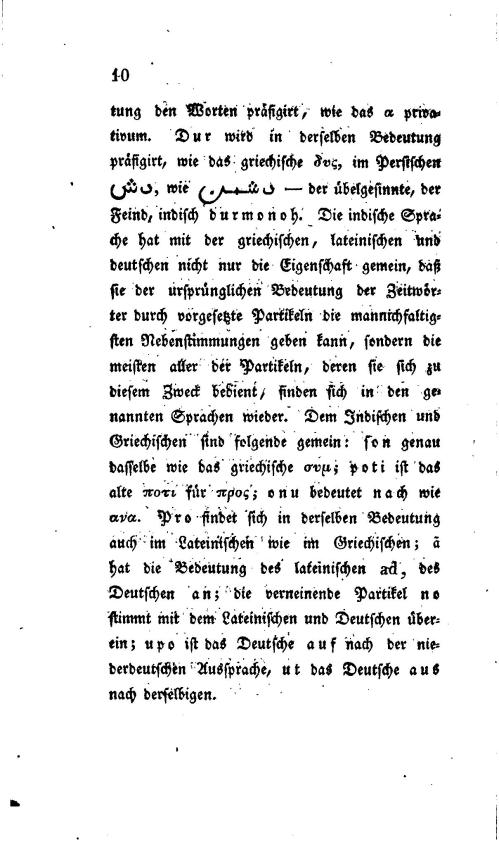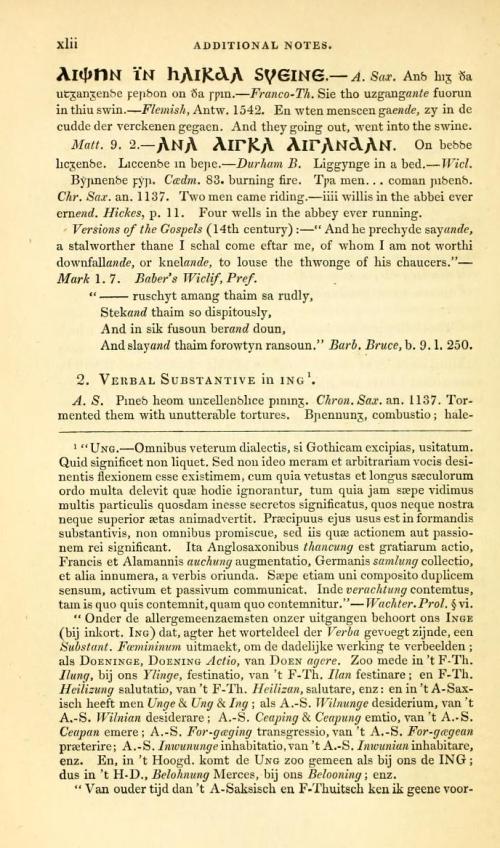How leaving out explanations kicked historical linguistics upward
Previously on Shells and Pebbles
How many people could read Arabic script in
Germany around 1800? The question struck me in 2006 as I was making my
first steps in intellectual history with a paper on Friedrich Schlegel’s
Über Sprache und Weisheit der Indier (1808). Schlegel’s
book – now considered a groundbreaking work in comparative linguistics –
includes samples of untranscribed Persian, to show that Persian is part
of the same language family as Sanskrit, Greek, Latin and German and
has the same “organic” system of conjugation. You don’t really need to
know Arabic script to get that point, and for all we know Schlegel had
at best a very limited grasp of Persian. But if you want to test and
elaborate Schlegel’s ideas, well yes, then you need to. The use of Arabic
script in a book for German readers is unmistakably snobbery, but the
real question is whether that snobbery was also useful.
Seven years later I still don’t know the answer to my initial
question, but I can make an educated guess. There was Arab printing
type. Professor Michaelis in Göttingen (actually Schlegel’s
uncle-in-law) was teaching Arab to generations of theology students. The
Austrian mission to the Sublime Porte included a school for translators
– the so-called Sprachknaben – among whose pupils was Joseph von
Hammer-Purgstall. (At that point Turkish was still written in Arabic.)
Knowledge of oriental languages was an asset, if far from mandatory for
theologians, and many learned pastors dallied in Hebrew and Aramaic.
Wilhelm von Humboldt knew the basics of 33 languages; Adelung and Vater
made a compilation of Paternosters in all the 500 known languages; a
decade later, Goethe wrote West-Östlicher Divan. Still, there
could have been hardly more than a thousand people capable of reading
Schlegel’s Persian at the time, and these need not have been Schlegel’s
readers.
Schlegel is far from unique in that kind of snobbery. Jakob Grimm’s Deutsche Grammatik and the Deutsches Wörterbuch require substantial work and training to even make sense to the reader – for
me, several courses in German historical linguistics under the eminent
Dr. Quak were not enough. The important thing is, Grimm’s contemporaries
were in the same fix. The work of the Grimm brothers does not “reflect”
the state of learning in the early 19th century. Rather, they were intentionally upping the standards so as to require others to keep up and finally turn Germanistik into a hard science. In his reviews, gathered in Kleine Schriften, we can see Jakob Grimm asserting a gatekeeper role: the editorial work of others (most others,
with the exception of Lachmann) is rejected in downright brutal terms
as “sloppy”, “useless”, and “outdated”. E.F.K. Koerner and Joep Leerssen
have it that Grimm only became so severe after his own first work, the Altdeutsche Wälder, had met with a similar crushing review from August Wilhelm Schlegel, the less original but hard-working Schlegel brother.
We could call this phenomenon the performative use of snobbery. (“Performative”
is a term of art from speech act theory; it means to bring something
about by saying something, or more widely by performing some symbolic
act.) Just as composers like Liszt, Rachmaninov and Ligeti have been
upping the standards for pianists by writing “unplayable” scores,
scholars have been kicking the discipline upward not merely by writing
programmatic texts but also by leaving out “unnecessary” information.
The learned and wealthy public of Europe could gloat over the
magnificent prints from the Description de l’Egypte, but the Monumenta Germaniae Historica are
absolutely useless and unappealing to the lay reader. (By contrast, one
of Grimm’s reviews takes the British parliamentary archives to task for
publishing all their medieval charters in prestigious folios without
any consideration of scholarly relevance, “made to gather dust”.) In
doing so, the Grimms and Schlegels and others have introduced a new
“paradigm” in the original sense of the term: an example for others to
emulate. That “paradigm” does not per se include a Gestalt switch of
different world views, but it does include a new way of ordering and
presenting findings, of transforming information into knowledge. To get
that founded, a little snobbery is indispensable.
Performatives can also fail. If people do not acknowledge your act or
follow suit, then the attempt is (Austin’s term) “infelicitous”. For
instance, the Grimms and Lachmann also felt that Fraktur was a barbaric
alphabet and that capitals were a pedantic rudiment. So they published
their works in Latin letters, without capitals. Unfortunately for them,
the rest of Germany went on printing in Fraktur until Hitler finally
abolished it. In spite of the Grimms, German nouns still start with
caps.
Even works that are widely acknowledged as groundbreaking can still fail to break ground. John Horne Tooke’s Epea Pteroenta; or The Diversions of Purley (2 vols, 1785-96) was like Schlegel’s Über Sprache und Weisheit in
many respects. It was an idiosyncratic, slightly bizarre work which
presented a sensible idea supported by some samples in an opaque script
and a spurious overall argument. In Horne Tooke’s case, the sensible
idea was that language is not entirely representational; only nouns and
verbs stand for things and events, and all other words are
“abbreviations” that etymologically derive from these two. To make this
case, Horne Tooke presents a set of etymologies bad enough to be called
Heideggerian, and supports them with samples of Anglo-Saxon and Old
Gothic. Now Anglo-Saxon is relatively easy to grasp. Old Gothic is not.
Its script is an artificial alphabet modeled on Greek, created in the 4th
century AD by bishop Ulfila to translate the bible to the Ostrogoths.
The language and the whole branch of Germanic to which it belonged are
now extinct. The main source we have for it is the 6th-century Codex Argenteus, now
in Uppsala. Apart from the few dozen members of the Royal Society of
Antiquaries, few people could be expected to be able to read that.
Horne Tooke’s initial success was greater than Schlegel’s. For a few decades, The Diversions of Purley was
generally regarded as the best work in the study of language in
England, only to be superseded by William Jones’ posthumous fame when
the work of the Asiatick Society had sparked off a real revolution
among German scholars. The problem was not that Horne Tooke’s
etymologies were spurious; so was Schlegel’s idea of “organic”
declination as a sign of “divine revelation” as the source of
Indo-Germanic languages. But Schlegel’s original idea – systematically
comparing roots and declensions – could easily be replicated and
elaborated by more sober scholars, such as Bopp, Rask, Humboldt and his
boring brother August. Horne Tooke may have grasped, in hindsight, the
essentials of a structuralist approach to language, but etymology is not
the way to do that. His work continued to be reprinted well into the
1850s for the delight of the learned; Über Sprache und Weisheit was not, because it was devoured by its offspring.
For a closing note, let’s press the analogy further. How many people could read Old Gothic in late 18th-century
England? Less than a thousand, for sure. Anglo-Saxon still had some use
in the study of charters and local inscriptions; Old Gothic was only of
very remote antiquarian interest. But it had a print record. The text of the Codex Argenteus had been published in Oxford in 1750, with a grammar and Latin translation. There are samples of it in several issues of Archeologia, the journal of the Royal Society of Antiquaries; in Thomas Astle’s The Origin and Progress of Writing (1784),
actually a field guide to deciphering medieval manuscripts; and even in
the works of George Hickes a century earlier. In short, if you wanted,
you could find out. The use of Old Gothic type in such works was not
meant to make them completely arcane, but to make them more interesting
for those willing to make an effort. It was that level of scholarship
which Horne Tooke hoped to align with in putting his etymologies in
untranscribed Old Gothic. And that, indeed, is snobbery.
There is a moral to this. When old books seem hard to understand, it
need not be because the past is a foreign country, or because we lack a
shared set of assumptions. It can also be because they were meant to be
difficult.
maandag 15 juli 2013
Abonneren op:
Reacties posten (Atom)



Geen opmerkingen:
Een reactie posten